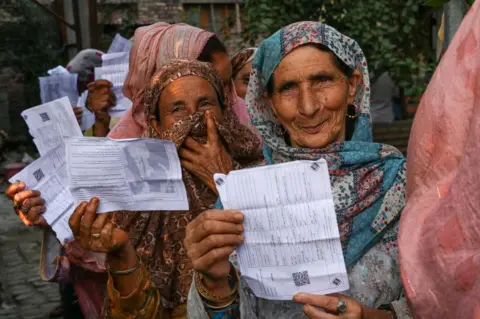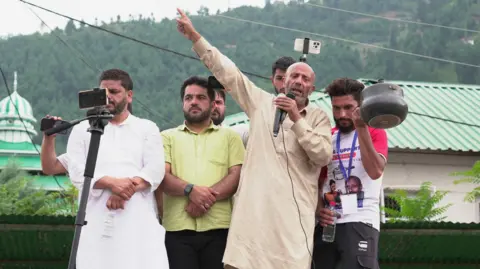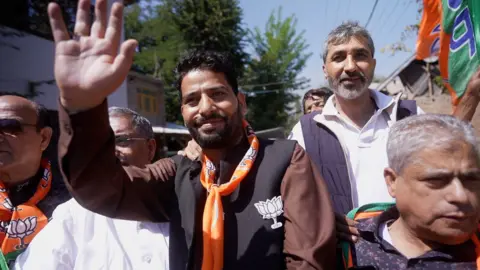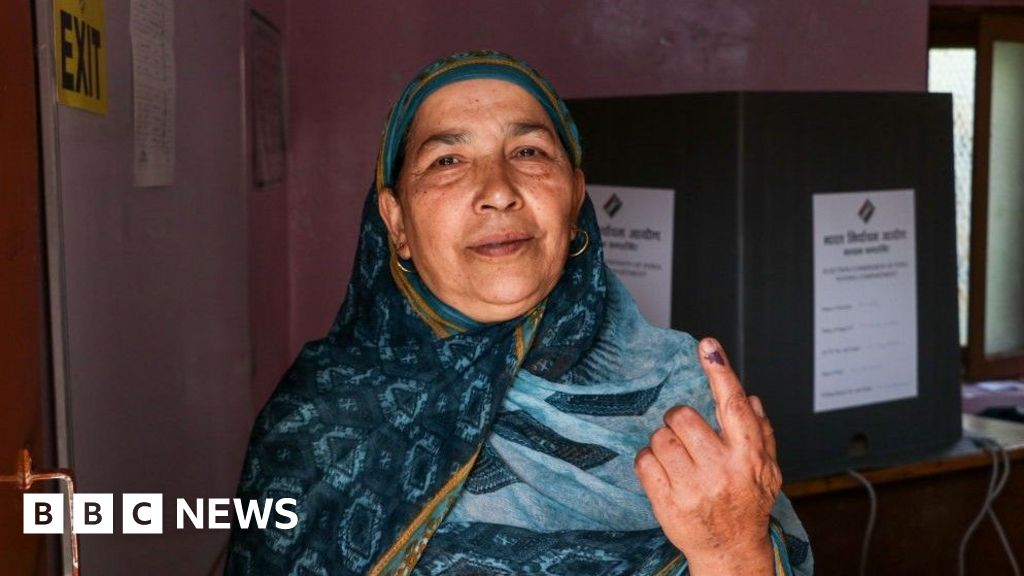 Getty Images
Getty ImagesNestled in the mountains of Indian-administered Kashmir, Shopian – once a hotbed of militancy – sees a steady stream of voters entering a polling booth.
The former state of Jammu and Kashmir – now divided into two federally administered territories – is holding its first assembly election in a decade. The third and last phase of voting is on Tuesday and results will be declared on 8 October.
Since the 1990s, an armed separatist insurgency against Indian rule in the region has claimed thousands of lives, including those of civilians and security forces.
Earlier, elections were marred by violence and boycotts as separatists saw polls as a means for Delhi to try and legitimise its control. The high voter turnout now signals a change – people here say they have waited long to be heard.
“The level of poverty in our area is severe,” says 52-year-old Mohammad Yusuf Ganai after casting his vote. He laments that the lack of jobs has forced educated young Kashmiris to “sit at home”.
The last elections a decade ago resulted in a coalition government that collapsed in 2018. Before new polls could be held, Prime Minister Narendra Modi’s Bharatiya Janata Party (BJP) government revoked the region’s autonomy and statehood, sparking widespread discontent among Kashmiris.
For five years, Jammu and Kashmir has been under federal control with no local representation, and this election offers people a long-awaited chance to voice their concerns.
“We will finally be able to go to the elected official with our problems,” says 65-year-old Mohammad Abdul Dar.
 Bilal Kuchay
Bilal KuchayNearly 150km (93 miles) away in Uri, the last town near the Line of Control – the de facto border with Pakistan-administered Kashmir – newly elected MP from the Awami Ittehad Party (AIP) Engineer Rashid addresses a frenzied crowd. In jail since 2019 on terror funding charges that he denies, Rashid was granted interim bail to campaign for the election.
People flock to his motorcade, one seeking a selfie, another offering a jacket, as Rashid’s personal struggles appear to resonate deeply with voters.
“I want development and a resolution to the Jammu and Kashmir issue,” Rashid says. Being part of the system now as a lawmaker, he adds, will help him raise these issues in Delhi.
Civil engineer Tanvir Chalkoo, 29, listens intently to Rashid.
Calling the scrapping of autonomy the “worst kind of injustice”, Tanvir asks why as an Indian he should be treated any differently.
“People have been deprived of their rights for the last 10 years,” he says.
 Saraskanth TK
Saraskanth TKThe BJP government insists that scrapping the region’s special status and placing it under direct rule has brought peace and development, with Prime Minister Modi announcing $700m (£523m) in projects during a visit in March. It’s now up to BJP candidate Engineer Aijaz Hussain in Srinagar’s Lal Chowk to convince voters of this message.
“Previously, no one would go door to door [to campaign]. Today, they are. This is our achievement, isn’t it?” says Aijaz.
He points to the increased voter turnout as proof of faith in the election process, with the recent parliamentary elections seeing record participation. Yet, despite these claims, the BJP did not contest those elections and is now only fielding candidates in 19 of the 47 assembly seats in the Kashmir valley.
The party’s stronghold remains the Hindu-dominated Jammu region with 43 seats, where it is hoping to score well.
“Our organisation is weak in other constituencies,” admits Aijaz.
The Hindu nationalist BJP has been trying to make inroads in the Muslim-majority Kashmir valley, where it has had little presence.
Aijaz’s cavalcade of nearly 50 BJP-flagged cars drove through Srinagar’s narrow lanes, a show of strength unimaginable in Kashmir just a few years ago.
While some come out of their homes to greet Aijaz with sweets, others refrain. The BJP is still seen by many here as the party in Delhi which took away their autonomy.
Maleha Sofi, 24, is disillusioned with the BJP, believing the touted peace has come at the cost of personal liberties, and has decided not to vote. “We are not allowed to say anything,” she says.
Legacy parties like the People’s Democratic Party (PDP) have made this central to their campaign.
“This election is an act of self-preservation for Kashmiris,” says Waheed Para, the party’s candidate from Pulwama. “It’s a step to reclaim what was lost and preserve what we have.”
In 2020, Para was jailed for nearly two years, accused of aiding banned separatist groups. India has long faced accusations of human rights violations in Kashmir – it denies this – but critics say this has intensified in the past few years.
 Saraskanth TK
Saraskanth TKAhead of the assembly election, Amnesty International accused the government of fostering a “climate of fear” and urged an end to arbitrary detentions under strict anti-terror laws used to silence dissent on Jammu and Kashmir.
But the BJP government in Delhi has always taken a hard line on this. Aijaz says “all those people who are with separatists will be dealt with very seriously”.
While regional political parties promise change and say they are fighting for the rights of Kashmiris, how much influence will they have after these elections?
Lawyer Zafar Shah anticipates friction between the federal administration and the elected government which will soon assume charge.
Before 2019, when Jammu and Kashmir was a state, the chief minister could enact laws with the consent of the governor, who was bound by the state cabinet’s recommendations.
Now, as a federal territory under a Lieutenant Governor (LG), the chief minister must get the LG’s approval, especially on sensitive issues like public order, appointments and prosecutions. Power has shifted, says Mr Shah, as the LG won’t act without clearance from the federal home ministry.
“Whether the LG can create hurdles in the government’s working, that’s a matter to be seen when an actual situation arises,” adds Mr Shah.
Despite the challenges, many in Kashmir hope these elections will give them a chance to finally have their own representatives to voice their concerns.


